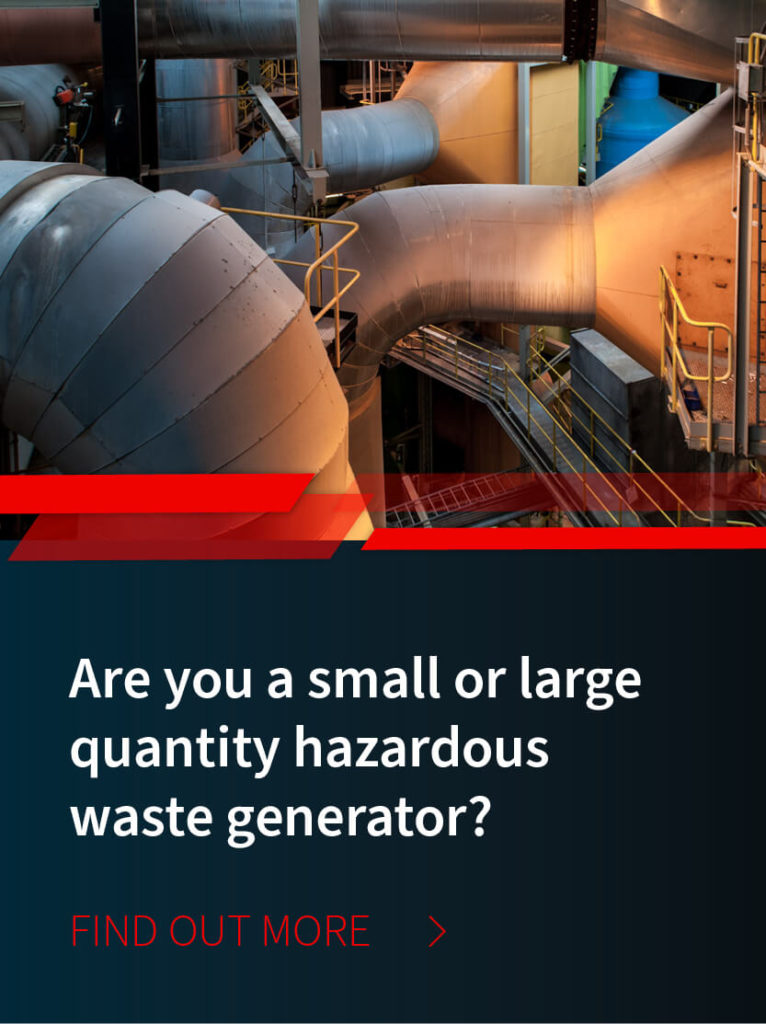
/ IN THIS BLOG
Hazardous waste audits are probably not on the top of your company’s agenda. But, if your business creates, stores and disposes of hazardous waste, it’s only a matter of time before you’ll be faced with an RCRA hazardous waste audit. Unannounced inspections are common, and failing a RCRA hazardous waste audit can result in serious fines, operational disruptions, and long-term regulatory scrutiny. That’s why preparation is an essential part of any business’s day-to-day practices.
Whether you're managing a single facility or overseeing multiple sites, knowing how to maintain compliance with EPA generator status, hazardous waste manifest requirements, and training protocols is key to avoiding costly penalties. The good news? With the right systems in place, you can stay audit-ready every day and eliminate the fear of the unexpected.
01 / Surprise Inspections, Expect No Warning
Unlike scheduled audits in other industries, hazardous waste inspections can happen without advance notice. An inspector may arrive unannounced, ask to speak with the facility manager, and begin the audit immediately. There’s no prep time, no heads-up, and no room for scrambling. If you’re practicing proper compliance activities, this shouldn’t be more than a blip on your business’s radar. But, if your team has let some compliance practices slip, an auditor’s arrival can feel like the beginning of a long and excruciating process. No business can grow and thrive with that type of threat handing over its head.
To stay ahead of surprise inspections, facilities must operate as if every day is audit day. That means maintaining current documentation, ensuring staff are properly trained, and routinely reviewing your hazardous waste procedures. Designating a compliance lead to oversee readiness can help prevent gaps and keep critical information, like manifests and EPA generator status details, easily accessible at all times.
02 / Train Your Team on RCRA Hazardous Waste Regulations
Just like so many parts of your business, compliance begins and ends with your people. Even the most well-documented hazardous waste program will fall short if employees don’t fully understand what’s required of them. During a RCRA hazardous waste audit, one of the first red flags inspectors look for is untrained or improperly trained staff.
At a minimum, your team should be able to:
Identify RCRA hazardous waste correctly
Use the appropriate labels and containers
Understand time limits for storage based on EPA generator status
Maintain and understand required documentation during accumulation, storage, and disposal
Don’t assume everyone “just knows” the rules. Regulations evolve, job roles shift, and training fatigue is real, especially in fast-paced industrial environments. Regular refreshers, practical instruction, and scenario-based training all go a long way toward building a culture of compliance.
If managing training feels overwhelming or unclear, MCF Environmental can help. Our team works with facility managers to develop customized programs that address RCRA training gaps and ensure every employee understands what’s at stake.
03 / Get Your Hazardous Waste Manifests in Order
Hazardous waste manifests are the paper trail proving you’ve handled, transported, and disposed of waste properly. These essential documents are also one of the first things auditors will ask to see. Hazardous waste manifests confirm that your facility has followed every step required by law, from cradle to grave.
To stay compliant, you should:
Retain manifests for at least three years (two years is often the minimum requested during audits)
Keep records on site, either as hard copies or in a digital system that can be accessed instantly
Ensure that only properly trained and authorized staff are signing off on manifests
Inspectors often request documentation for all shipments within a specific time frame, especially if they notice discrepancies in drum counts or storage timelines. Incomplete or missing manifests can result in immediate violations, even if everything else is in order.
If you’re unsure whether your manifest process is compliant, or if your documentation system is audit-ready, MCF Environmental can provide comprehensive feedback. We help facilities establish airtight recordkeeping protocols and ensure manifests align with EPA and state-specific standards.
04 / Know and Comply with Your EPA Generator Status
Your EPA generator status isn’t just a label—it determines exactly what regulations your facility must follow. Whether you're classified as a Very Small Quantity Generator (VSQG), Small Quantity Generator (SQG), or Large Quantity Generator (LQG), each category comes with different requirements for storage timeframes, volume limits, and reporting obligations.
For example:
SQGs typically have 180 days to ship hazardous waste offsite
LQGs must comply with stricter storage timelines and reporting, including submitting a biennial report to the EPA
Exceeding your allowed storage volume or keeping waste onsite too long can instantly trigger a violation
Maintaining alignment between your manifests and generator status is critical. If an inspector finds shipment dates or drum counts that don’t match your category, it may result in penalties—even if it was unintentional.
Keeping tabs on your generator status can be complex, especially if your waste output fluctuates. That’s where an experienced partner like MCF Environmental can offer guidance. We help facilities monitor thresholds, stay within compliance, and adjust protocols as your waste generation changes.
05 / Understand the Difference Between State and Federal Audits
While the EPA sets the overarching hazardous waste regulations, day-to-day inspections are typically handled by state environmental agencies. Unless your facility is exceptionally large or under federal investigation, you’re far more likely to undergo a state-led RCRA hazardous waste audit.
That said, state inspectors enforce both federal and state-specific rules—and the penalties for violations can be just as serious. It’s also worth noting that enforcement ramps up for repeat violations. If your facility has been warned about a compliance issue before, expect less leniency and steeper fines the next time around.
The best mindset? Treat every day like an audit day. Whether you're managing a small maintenance shop or a large industrial site, your staff and systems should be prepared for an inspector to walk through the door at any moment.
06 / Reduce Risk with a Hazardous Waste Management Partner
Staying on top of hazardous waste compliance isn’t just about checking boxes—it’s about managing an evolving, high-stakes responsibility. With shifting regulations, strict documentation requirements, and the ever-present risk of an unannounced audit, even experienced facility managers can feel overwhelmed.
That’s where the right partner makes all the difference. A reputable hazardous waste management company can:
Help maintain accurate manifests and EPA generator status compliance
Provide staff training and refresher courses tailored to your operation
Offer routine pickups and proper labeling guidance
Just as important: choosing the wrong partner won’t protect you during an inspection. If your waste vendor is noncompliant, your facility is still on the hook.
MCF Environmental has decades of experience helping organizations navigate complex hazardous waste regulations. We don’t just haul waste—we build long-term compliance strategies that protect your business.
Be Proactive, Stay Compliant:
A RCRA hazardous waste audit doesn’t have to be a source of stress—if your facility is prepared. With the right training, documentation, and awareness of your EPA generator status, you can handle even surprise inspections with confidence.
Still unsure whether your site is audit-ready? MCF Environmental Services is here to help. From staff education to manifest management, we provide the tools and expertise you need to maintain full compliance, day in and day out. Don’t wait for an audit to occur, reach out today for the safety and security of your business.
07 / Frequently Asked Questions About RCRA Hazardous Waste Audits
What triggers a RCRA hazardous waste audit?
Audits may be random, complaint-driven, or triggered by reporting irregularities. Many inspections are unannounced, especially at facilities that generate large amounts of hazardous waste.
How long should I keep hazardous waste manifests?
The EPA requires that manifests be retained for at least three years, but inspectors often ask for two years of records on the spot. Keeping them organized and accessible is essential.
What is EPA generator status and why does it matter?
Your EPA generator status—VSQG, SQG, or LQG—determines how much hazardous waste you can store, how long you can store it, and what reporting is required. Misclassifying your status can result in violations.
What if my employees aren’t properly trained?
Training gaps are a major compliance risk. If staff can’t correctly identify or manage hazardous waste, your facility may face fines—even if the mistake was unintentional.
Can a hazardous waste management company help with compliance?
Yes. A qualified partner like MCF Environmental can assist with training, manifests, pickup schedules, and documentation—making it easier to stay compliant and audit-ready.
Robert Losurdo
President, COO








